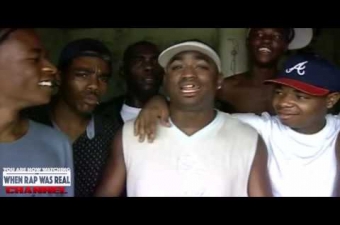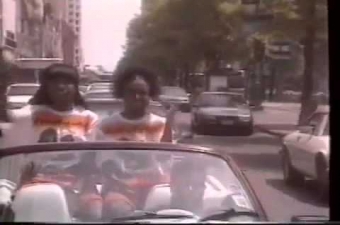Peaches Records
3129 Gentilly Blvd.New Orleans LA 70122
Peaches Records, a fixture of New Orleans’ music community for decades under proprietor Shirani Rea, was vital to the growth of the city’s hip-hop scene in the 1990s. Rea, known to some as Mama Peaches, hired artists to work at the shop and guided the professional development of others, including the Cash Money Records team before they scored a landmark national distribution deal in 1998. “The local artists are all my children,” she told OffBeat.
Mia X started working behind the counter at Peaches in 1990, after emerging as one of New Orleans’ first hip-hop lyricists by rapping with the DJ crew New York, Incorporated, which included fellow teenagers Mannie Fresh and DJ Wop. In 1993 and 1994, she rang up thousands of copies of her own solo record, “Da Payback,” a response to sexist bounce lyrics.
At the time, Scott Aiges reported for the Times-Picayune: “Bounce tapes by local artists outsell the biggest releases from such national rappers as Snoop Doggy Dogg and Ice Cube by 10 to 1 at Peaches Records (the Gentilly Boulevard store that is at the epicenter of the bounce craze).”
No Limit Records
Mia X’s success attracted Master P, the rapper and CEO of No Limit Records, who went to Peaches to recruit her to his label (she was off that day, but he found her at home). She left her job at the shop and became a staple of No Limit’s success for the rest of the decade, dropping gold albums and verses on platinum singles.
When Master P relocated No Limit to his native New Orleans from the Bay Area around 1995, Peaches became a crucial outlet for the label. Rea told Boss Talk 101, “I’d call Master P when there was a new release, even at 12 o’clock at night, he’d bring the stuff to me.”
KLC, the DJ and producer who anchored No Limit’s in-house production team, Beats by the Pound, recalled of Rea: “She dealt with [Master] P and [Cash Money Records co-founder] Baby hands-on…anything that was dealing with No Limit and Cash Money, she talked to the two bosses. They didn’t want to go through nobody [else]…because they knew how instrumental she was in the success of the artists and the companies.”
In 1996, P’s hustling paid off with a national distribution deal from Priority Records that allowed him to retain ownership and creative control of No Limit’s output.
Cash Money Records
In the mid-90s, Cash Money was one of many independent rap labels in town relying on Peaches for sales, promotion, and connections to the record industry. In-store performances brought the likes of Public Enemy and Tupac into the heart of the local scene.
The exterior wall of the shop featured rotating murals promoting new releases and projects. Rea leased the space to radio stations and labels, which used it to jockey for supremacy.Young rappers hung out at the store every day, playing pinball and keeping tabs on Peaches’ list of top-sellers.
Mannie Fresh, Mia X’s former collaborator who became Cash Money’s sole in-house producer. made his own use of the store, according to Rea: “Every single track he was laying, he would bring it, play it at [Peaches], and see the audience reaction to it…he made sure to test market it.”
Rea supported Cash Money in other ways, too. Juvenile, a member the label’s Hot Boys, told ethnomusicologist Holly Hobbs that Peaches and Odyssey Records, the other major hip-hop retailer in New Orleans, “were willing to do photo shoots and let us shoot our videos there, bring our interviews there.”
Another member of the Hot Boys, BG, released a solo album in 1996 called Chopper City. According to Rea, she sent a copy to Universal Records along with Cash Money’s sales figures “to get them a contract.” However, in The Big Payback author Dan Charnas describes how Universal learned of Cash Money after the hip-hop consultant Wendy Day “stopped by Peaches…to find out what was hot, and landed on a CD by an artist named Pimp Daddy.” In any case, Peaches was their portal to Cash Money, whose success there helped them leverage a $30 million distribution deal with Universal that followed the No Limit model.
More than the majors
Rea hired a lot of staff from within the music community, like Loren Phillips, the sister of “DJ Irv” Phillips, who created bounce music with MC TT Tucker in Ghost Town Lounge in 1991. (As recorded by the Neighborhood Story Project, Loren drove him to that gig every Friday, and, before that, to her chagrin, was the source of the records he used to scratch). She published a magazine called Da R.U.D.E.—Raw Uncensored Dope Entertainment—documenting New Orleans’ hip hop scene from the inside, which was available at Peaches.
KLC recalled that “Anytime….an artist fell on hard times, [Rea] gave them a job in her store.” Around 2000, she hired Mobo Joe when he got out of prison. He’d founded Mobo Records in 1992, which filled shelves at Peaches with releases by Ruthless Juveniles, Dog House Posse, and Ricky B, among others.
Mia X described the shop’s staff to Hobbs: “There was two different types of jazz experts and two different types of reggae experts and two different types of hip hop experts. Then there was R&B and gospel, and so that’s why it always seemed crowded like it was so many of us [employees] but… when you came looking for something we had the information you needed.”
The store’s reggae section was a specialty. Rea told WGNO, “My first record to produce was a reggae record, believe it or not, at Allen Toussaint’s Sea Saint Studio.”
Origins and location history
Rea’s first store opened Uptown on S. Carrollton Avenue in 1975 as part of a chain that sold records in the kind of wooden crates that farmers used to transport peaches. After expanding across the country at breakneck speed in the mid-70s, Peaches’ Los Angeles-based parent company went bankrupt in 1981. Rea and her then-husband, Harris “Lee” Rea, took the New Orleans franchise independent, opening the Gentilly location by 1984.
Harris left Peaches in the early 1990s, eventually founding an independent label, Louisiana Red Hot Records, which issued albums by a slew of New Orleans musicians, from the venerable Wardell Quezergue to Cyril Neville, and remains active today with the Americana artist Lilli Lewis as vice president.
Meanwhile, Rea opened another Peaches location in the Riverwalk mall. It closed after Hurricane Katrina, as did the Gentilly location, which flooded when the levees failed.
Three years later, in 2008, Rea reopened on Decatur Street, in a space vacated by Tower Records. In-store performances at this site served as a de facto stage of the French Quarter Festival each April.
Seeking a location more accessible to locals, in 2016 Peaches moved to its current site at 4318 Magazine Street. The building used to house a Woolworth’s, and Rea restored its lunch counter as a monument to the 1960 sit-ins that challenged segregation in New Orleans.
Rea’s children, Lillie and Lee, now mind the shop. In addition to records and gifts, they sell apparel emblazoned with Peaches’ distinctive logo, which has been worn on stage by the likes of Mannie Fresh and PJ Morton.
Videos

An extended conversation with Peaches Records proprietor Shirani Rea on the podcast "Boss Talk 101" from 2023.
Video by BOSS TALK 101.
An extended conversation with Peaches Records proprietor Shirani Rea on the podcast "Boss Talk 101" from 2023.

The television show "Straight from the Projects," featuring footage of the No Limit artist C Murder visiting Peaches in Gentilly ca. 2002.
Video posted by When Rap Was Real.
The television show "Straight from the Projects," featuring footage of the No Limit artist C Murder visiting Peaches in Gentilly ca. 2002.

The video for "Bootin' Up" by Da' Sha Ra', a bounce hit in 1993, features a glimpse of the counter at Peaches Records--a sign of the shop's integral place in the local scene.
Video posted by RGS - RapGameStudent.
The video for "Bootin' Up" by Da' Sha Ra', a bounce hit in 1993, features a glimpse of the counter at Peaches Records--a sign of the shop's integral place in the local scene.
Images


















